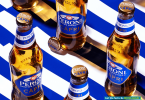“Achieve your margin and look after your customers in every way you can!”
Surprising fact: NOffLA’s new Chairman, Cork’s Gary O’Donovan, knows his way around a carwash. That’s because his first job involved him working in one in his Dad’s Douglas Autocentre from whence he graduated to petrol pump attendant….
His father, Joe, went on to open an off-licence there in 1980 and through the 80s teenager Gary toiled away at the off-licence till, something which wouldn’t be possible today, he points out.
He took a BA in Economics and Sociology in 1991 before his father invited him to help set up a second off-licence in Summerhill.
Today, Gary runs The O’Donovan Group of 16 off-licences and has just become Chairman of the National Off-Licence Association.
Having taken over the business on the death of his father in 2003, Gary, a member of the Champagne Academy since 1994 and awarded the WSET Diploma in 1995, can look back with pride on founding the very successful Annual Cork Wine Fair and the Cork Wine School in 2010 following15 years lecturing for the Wine Development Board of Ireland.
Public Health Bill
Gary takes up NOffLA’s Chairmanship during what the Chinese might call “interesting times”. Former Chairperson Evelyn Jones has become NOffLA’s Government Affairs Director with a brief to lobby the government.
The Public Health (Alcohol) Bill waits in the wings, it’s appearance centre-stage eagerly anticipated.
“With the government finally taking action on this, it’s an absolute must for the drinks industry generally and for NOffLA in particular,” he says, “The evidence is out there from every strand of society that alcohol is being sold in an irresponsible manner by large multiples which is having a detrimental impact across our entire community in terms of health, social order and economically.”
Like previous incumbents, the new Chairman has a ‘wish-list’ that includes a lowering of wine excise duties and a reduction in VAT.
“The duty rate is so punitively high that alcohol retailers are disproportionately affected when compared to other retailers who are already having to deal with increased commercial rates, charges and other taxes,” says Gary, “Ireland’s excise duty rate levels are at a level far detached from other EU countries and makes us appear very expensive.”
Gary feels it important too that NOffLA liaise more closely with its own members and increase membership., “…. bringing some of the bigger groups into the fold along with our associate suppliers who need to be communicated with and brought into the equation to ensure their future where the independent trade is an essential harbinger of their future too”.
Of course at the same time, he understands how easy it seems for a new brush to sweep all around; he’s “completely conscious of the ‘Obama effect’” so he’s not going to over-promise.
“The essential point I want to bring to the fore as Chairman is that of improving the lot of our members to run a viable business in the midst of a challenging market at day-to-day level, making doing their duties as responsible retailers of alcohol that bit easier and improving their business again on a daily basis.”
MUP
With the government having moved towards Minimum Unit Pricing with all the speed of a slug on Seconal, surely MUP is too little too late for the independent trade?
“One can never say that it’s too late for this,” he responds, “It’s still essential that MUP is implemented – but it depends on the price that any MUP is set at. We believe that 70 cents per gram of alcohol is the appropriate MUP and gives the policy a chance to be effective in the Irish market. Any level below this and the Government risks implementing an ineffective policy that only pays lip-service to the health lobby.”
Below-cost selling
Would a simple ban on Below-cost selling be more effective?
“Below-cost selling can tackle irresponsible promotions where MUP fails – ie premium drinks would not be able to be used to increase footfall. MUP will stop bottles of cheap vodka selling for less than €14, but it will still allow for the top brands, that cost far more to produce, to be sold this cheap.
“From an industry perspective, below-cost selling is causing mayhem in the market for both suppliers and retailers and sometimes, ironically, it’s inadvertently subsidised by the State through VAT rebates.
“So lots of problems are being created by it and the State is unwittingly being a part of it. It remains one of our priorities for the future health of the industry as a whole in Ireland.
“Below-cost selling is often written-off as an option given its ineffective introduction in Britain last year where cans of beer can still be bought for 41p; however we would maintain that ‘cost’ must be defined as the invoice price plus tax instead of Britain’s ‘floor price’ of duty plus VAT, ignoring any cost of production.”
“Don’t get in involved in the price war”
So how can this behaviour from the multiples be countered?
“Invest heavily in staff and training, in customer care and don’t get involved in the price war that only the multiples can win. Pick your battles,” he advises.
Potential for growth
Despite it all, Gary sees potential for further growth in the take-home/off-trade “… but going forward, it’s strictly surrounded by the reality of the Public Health (Alcohol) Bill and the statutory Code of Conduct for mixed-trade retail of alcohol.
“If the Government takes action and does what it says it’ll do by way of pricing and Sections 9 and 16 (which involve structural separation and MUP) this will provide a fairer playing field for importers, suppliers and retailers and will end the unfair activity from the multiples which use alcohol as a footfall driver.”
One thing has become increasingly clear: “It’s hard to see us going back to the levels we were at in previous decades, so growth will be hard to come by.”
He forecasts too that within the industry consolidation will invariably continue in both the on- and off-trade, “… and this will happen both from the domestic and international markets”.
He came across a statistic recently indicating that the RoI alcohol market had shrunk 25% between 2001 and 2014 “… so that gives you an idea of the problems the industry faces in looking at a declining market. It’s hard to see where growth can come from but I do see customers becoming more focused and more exact in what sort of product they want and where they want to purchase it”.
Within the off-trade community, Gary counts himself a big fan of “one of the originals in the trade” Tommy Cullen at Jus de Vine in Portmarnock, “…. a well-run operation with great staff, great professionalism, great presentation and a great business model. If you work hard, Tommy is a great example of a business thriving as a result.”
So success is possible, but to have a viable a future, the off-trade really does require government to leap from planning to putting laws into effect.
Could it do more?
“Absolutely! The Government has the key to solve most of the ills in the drinks industry by enacting the Public Health (Alcohol) Bill, banning below-cost selling, bringing excise duty down to a feasible level, ultimately bringing some clarity and certainty back into the trade which has not been present since the repeal of the Groceries Order in 2006.”
In light of all this, what’s his advice to newcomers to the off-licence trade in 2015?
“Strive to achieve the levels of excellence and responsibility as benchmarked by your peers across the industry. Achieve your margin and most importantly look after your customers in every way you can!”








